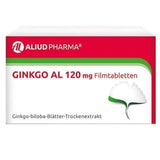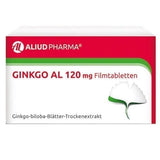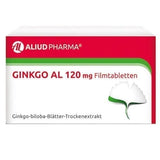Mild cognitive impairment Ginkgo AL 120 mg film-coated tablets
For use in adults
Active ingredient: Ginkgo biloba leaf dry extract. Herbal medicine to improve age-related cognitive impairment and quality of life in mild dementia. Contains lactose and glucose.
For Mild cognitive impairment risks and side effects, read the leaflet and ask your doctor or pharmacist.
ALIUD PHARMA GmbH, Postfach 1380, 89146 Laichingen
Mild cognitive impairment GINKGO AL 120 mg film-coated tablets
To strengthen memory in old age with mild dementia
• Herbal medicinal product
• Effective for declining ability to concentrate and learning difficulties in old age with mild dementia
• Well tolerated
• Available in different strengths
For declining concentration in old age
with mild dementia
Our brain is constantly challenged to process new impressions and store information. As early as the age of 30, memory capacity slowly begins to decline; in the 50 to 60 year olds, the ability to learn and concentrate are exhausted much more quickly. The reason for this is that the mitochondria, which supply the nerve cells with energy, become weaker over the years. This slows down the transmission of information and makes it increasingly difficult to remember things or learn new things.
Just like the muscles, the brain can also be kept fit: Even short units of memory training have a positive effect, and concentration and memory can also be supported with suitable medication. GINKGO AL contains an extract from ginkgo biloba leaves as an active ingredient, which can protect nerve cells from harmful influences and stabilize the function of neurotransmitters in the brain that influence memory and learning.*
Herbal medicinal product
The ginkgo biloba tree, native to China and Japan, is considered a very special plant. It is extremely resilient and can live up to 1,000 years. Its fan-shaped leaves are not only a symbol of friendship and love in poetry, they are also valued in medicine due to the valuable ingredients and are used in the form of carefully prepared dry extracts for declining ability to concentrate with learning difficulties in old age and for mild dementia. A positive effect should also be achieved in diseases such as dizziness, tinnitus and claudication.
*National Institutes of Health (2019): Ginkgo Biloba for Mild Cognitive Impairment and Alzheimer's Disease: A Systematic Review and Meta-Analysis of Randomized Controlled Trials.
RECOMMENDATIONS FOR USE:
Unless otherwise prescribed by a doctor, adults and elderly patients take 3 GINKGO AL 240 mg film-coated tablets whole twice a day with plenty of liquid. The twice-daily dose can be taken independently of meals and should be taken in the morning and evening. Do not take the tablets lying on your back.
Regular exercise
Physical activity reduces the risk of developing dementia and promotes coordination and concentration. Light weight training can help people who are already affected to improve their balance control, making it easier to avoid dangerous falls.
memory training
Our brain can be trained just like the muscles. Just a few minutes of regular training can stimulate memory performance. Whether puzzles, quiz games or learning a language - the mental tasks should be as varied and fun as possible.
Maintain quality
of life Having dementia does not mean giving up all the beautiful things in life. New scientific evidence shows that people with dementia should keep doing what has brought them joy. This serves to stabilize and can slow down the course of the disease
Frequently asked questions & answers
How long can GINKGO AL be taken?
As is usual with herbal medicines, it may take some time before there is a noticeable improvement in symptoms. The treatment with GINKGO AL should therefore last at least 8 weeks. If the symptoms have not improved after 3 months, the doctor treating you should check whether the treatment should be continued.
How do you recognize the onset of dementia?
The signs can vary depending on the personality and circumstances of the person affected. Increased attention is required if everyday objects are frequently misplaced, the person concerned gets lost on familiar paths or there are increased problems with finding words. Out of shame and fear, those affected usually try to conceal corresponding mistakes. The higher the level of education, the longer the signs can be hidden. If you notice any deficits in yourself, please see your family doctor as soon as possible. The earlier the disease is detected, the better it can be treated.
Is dementia curable?
Despite intensive research, dementia diseases such as Alzheimer's dementia cannot be cured. Dementia is a chronic, progressive brain disease in which certain mental abilities such as orientation, language and memory are gradually lost. Even if the brain changes cannot be reversed, they can be significantly slowed down with drug and non-drug therapies.






